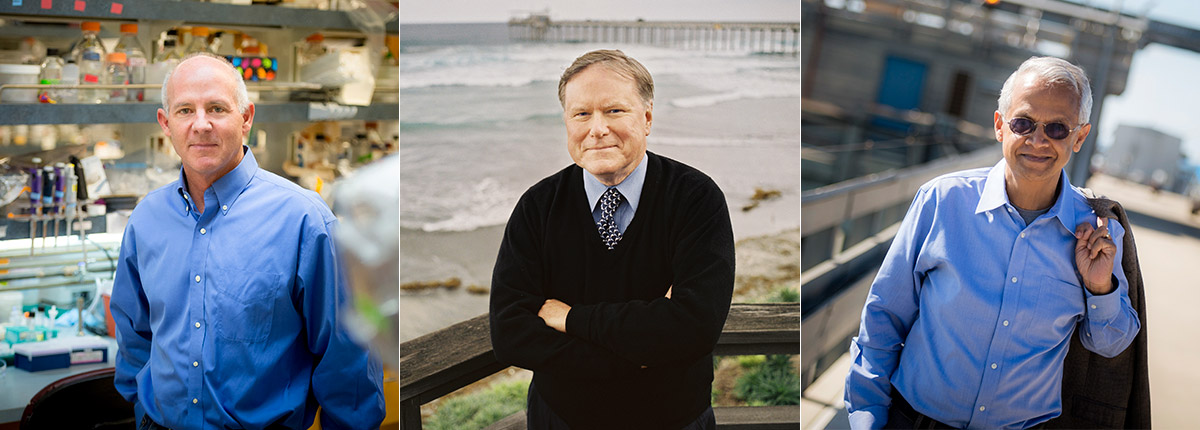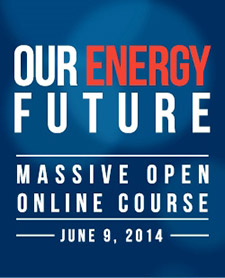Published Date
Share This:
UC San Diego Faculty ‘Go Global’ with Two New MOOCs

Stephen Mayfield, Charles Kennel and Veerabhadran Ramanathan
Two new Massive Open Online Courses, or MOOCs, created by UC San Diego faculty and featuring lectures from some of the campus’ world-renowned scientists, social scientists and historians are being made available free to students and anyone else around the world with access to the Internet.
The MOOC phenomenon has galvanized learning—people love technology, access and ways to reach the masses. The campus is looking into a variety of ways to deliver courses, from MOOCs (massive open online courses) to partially online (blended/hybrid) instruction.
The campus’ newest online course, “Our Energy Future,” begins June 9 and will run for 10 weeks on the education platform Coursera. Registration is available here. The second MOOC, called “Climate Change in Four Dimensions,” will be offered starting July 1 through Coursera. It was first offered in April and drew about 15,000 registrants. Registration for that 10-week course is available here.
“These are the future of education,” said Stephen Mayfield, a professor of biology who directs the California Center for Algae Biotechnology and created the “Our Energy Future” MOOC. “It’s not the only component going forward, but a critical piece that will allow us to deliver information in a much more efficient way to anyone and everyone.”

“Education is certainly not all about efficiency, but we have to come up with ways to make education affordable for everyone, at every age,” he added. “Learning should not stop when you leave college, and MOOCs allow anyone with a computer anywhere in the world access to state of the art education from the great universities of the world. This could be a game changer for the developing world, and UC San Diego needs to be part of this new era in education.”
Mayfield, who co-directs the campus’ Food & Fuel for the 21st Century organized research unit, designed the “Our Energy Future” MOOC to introduce students to the issues of energy in the 21st century—including the sustainable production of food and fuels, which are inseparably linked.
“Our MOOC is on sustainable energy, and this topic is simply essential knowledge for everyone these days,” he said. “Education is also essential if we are going to make informed decisions about our future, and no part of our future is more important than energy. It impacts every aspect of our lives. This MOOC will allow us to discuss the production and utilization of energy—from world experts—and deliver that information to anyone who wants it.”
The course will consist of short video lectures and interviews by 30 experts from UC San Diego, including Scripps Institution of Oceanography, as well as environmental industry leaders from around the world. It will focus on energy production and utilization from the biological science, engineering, economics, climate science and social science perspectives.
Presentations will also delve into the latest academic research and industrial developments in renewable energy technologies. Students will have access to more than 70 in-depth video segments, engaging assessments and assignments and a global community in which to ask questions and discuss renewable energy advancement.
The second MOOC, “Climate Change in Four Dimensions,” began its existence as a traditional classroom course in 2012 and views climate change from a variety of perspectives at the intersection of the natural sciences, technology, and the social sciences and humanities. It is intended for advanced undergraduates and graduate students.
Veerabhadran Ramanathan, a professor of climate and atmospheric sciences at Scripps Institution of Oceanography, initiated the course. Former Scripps Director Charles Kennel, a co-presenter, had the idea to convert it into a MOOC after the initial offering.
“My hope was to reveal to students around the world four different dimensions of thought about climate change—the science of mitigation and adaptation, energy policy, international relations, and social acceptance,” said Kennel.
In addition to presentations on the science of climate change from Ramanathan, Kennel and Richard Somerville, an emeritus professor at Scripps, the course features individual lectures from Naomi Oreskes, a former UC San Diego science history professor now at Harvard University, that touch on the history of climate change science. Lectures are also presented by David Victor, a professor at the Graduate School of International Relations and Pacific Studies, who discusses the politics of climate change and attempts to regulate the activities that cause climate change.
“We explained to the students that they were bound to encounter issues in other disciplines, and this course was designed to give them a head start on understanding how various disciplines approach climate change,” said Kennel. “What they learned might not help them right away with their theses, but it might help them with their lives later.”
He noted that the breadth of countries from which the 15,000 registrants in the first offering of the course came from led to an exciting comparison of varying experiences of climate change.
That’s what Mayfield also hopes to achieve globally with “Our Energy Future.”
Food and Fuels for the 21st Century is also launching a self-paced, shorter introductory version of “Our Energy Future,” session on Google Course Builder. That course also begins June 9.
With the potential global reach of each course, thousands of students are expected to participate in group discussions. No prior coursework in the subject is required. However, instructors highly recommend that participants have a working knowledge of high school-level math, as well as college-level introductory biology and chemistry.
Share This:
You May Also Like
Stay in the Know
Keep up with all the latest from UC San Diego. Subscribe to the newsletter today.



